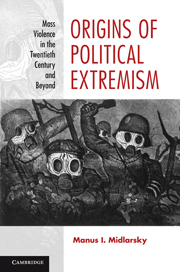Book contents
- Frontmatter
- Contents
- List of figures and tables
- Preface
- Introduction
- PART I Theory and Empirics
- PART II The Secular “Isms”
- PART III An Ostensibly Sacred “Ism”
- PART IV Extreme Nationalism
- PART V Conclusion
- 14 Pathways to Extremism
- 15 Ethics and Morality: The Rejection of Traditional Moral Restraints
- 16 War, Peace, and the Decline of Extremism
- References
- Index
16 - War, Peace, and the Decline of Extremism
Published online by Cambridge University Press: 05 June 2012
- Frontmatter
- Contents
- List of figures and tables
- Preface
- Introduction
- PART I Theory and Empirics
- PART II The Secular “Isms”
- PART III An Ostensibly Sacred “Ism”
- PART IV Extreme Nationalism
- PART V Conclusion
- 14 Pathways to Extremism
- 15 Ethics and Morality: The Rejection of Traditional Moral Restraints
- 16 War, Peace, and the Decline of Extremism
- References
- Index
Summary
At the end of the narrative of War and Peace, Leo Tolstoy generates a conversation between two of his main characters, Pierre Bezukhov and Natasha Rostov, 7 years after the Napoleonic Wars of 1812. Tolstoy tells us that Pierre and Natasha “talked as only a wife and husband can talk, that is, grasping thoughts and conveying them to each other with extraordinary clarity and quickness, in a way contrary to all the rules of logic.” The conversation:
“No, what were you saying? Speak, speak.”
“No, you tell me, mine was just something stupid,” said Natasha.
“… And what were you going to say?”
“Just something stupid.”
“No, but still.”
“It's nothing, trifles,” said Natasha, her smile shining still more brightly.
Pierre and Natasha revel in the pleasures of everyday life, the fruits of peace, indeed of victory that saw the death of the dashing warrior, Prince Andrei Bolkonsky, adjutant to the great General Kutuzov. The military genius Napoleon fails in his ambitions, but Pierre, a large bumbling character, and Nikolai Rostov, who lost his impetuous younger brother Petya in the war, survive. The critic James Wood comments, “Nikolai and Pierre, survive into peace, surrounded by women, who do not understand warfare, and by children, who must not. To live, the poet Yehuda Amichai writes, is to build a ship and a harbor at the same time: ‘And to finish the harbor / long after the ship has gone down.’”
- Type
- Chapter
- Information
- Origins of Political ExtremismMass Violence in the Twentieth Century and Beyond, pp. 360 - 376Publisher: Cambridge University PressPrint publication year: 2011

